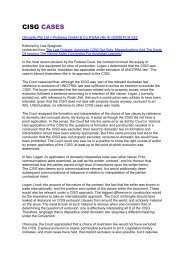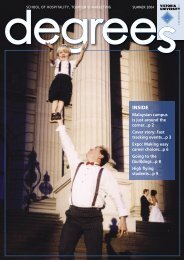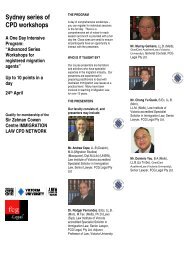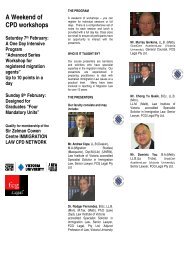A Glimpse Through the Kaleidoscope - Faculty of Business and Law ...
A Glimpse Through the Kaleidoscope - Faculty of Business and Law ...
A Glimpse Through the Kaleidoscope - Faculty of Business and Law ...
You also want an ePaper? Increase the reach of your titles
YUMPU automatically turns print PDFs into web optimized ePapers that Google loves.
LISA SPAGNOLO<br />
CISG. 65 Of course, it contributes to such a view, but o<strong>the</strong>r fragments may colour that<br />
view to sway <strong>the</strong> decision in ei<strong>the</strong>r direction.<br />
2.3 BARGAINING STRENGTH (RED)<br />
Bargaining strength probably influences choice <strong>of</strong> law in at least 26% <strong>of</strong> cases. 66 In<br />
<strong>the</strong> psychology <strong>of</strong> a choice <strong>of</strong> law, bargaining strength is <strong>the</strong> „id‟ as opposed to <strong>the</strong><br />
„ego‟. The counterparty with superior bargaining strength can <strong>and</strong> frequently does get<br />
<strong>the</strong>ir preferred choice <strong>of</strong> law. Just like any o<strong>the</strong>r terms in <strong>the</strong> bargain, <strong>the</strong> stronger <strong>the</strong><br />
market power <strong>of</strong> <strong>the</strong> counterparty, <strong>the</strong> more likely this is. Bargaining strength enables<br />
a party to insist on a particular choice <strong>of</strong> law simply because it can. In such a situation,<br />
little o<strong>the</strong>r rationale is required. A lawyer in favour <strong>of</strong> using <strong>the</strong> CISG will be unable<br />
to prevent its exclusion if <strong>the</strong> stronger counterparty insists on opting out. 67<br />
The stronger party‟s choice might be spurred by unfamiliarity with <strong>the</strong> CISG, leading<br />
to a general automatic opt out stance. It will <strong>of</strong>ten be because „that‟s <strong>the</strong> way we‟ve<br />
always done it‟ 68 , personified in <strong>the</strong> st<strong>and</strong>ard terms <strong>and</strong> conditions, which I will say<br />
something more about in a Part II. It might simply be that <strong>the</strong> superior party dislikes<br />
<strong>the</strong> CISG for a sensible, rational reason.<br />
However, bargaining power as a factor in choice <strong>of</strong> law is a two edged sword.<br />
Bargaining strength can also work in favour <strong>of</strong> adopting <strong>the</strong> CISG. 69 A „pro-CISG‟<br />
party in a stronger bargaining position can insist on using <strong>the</strong> CISG, whe<strong>the</strong>r by opting<br />
65<br />
See also Magnus, U., “Germany” supra fn 4, at p. 147: lamenting „reluctance towards/satisfaction with<br />
<strong>the</strong> CISG depends […] a great deal on how much practitioners specialise in international sales, how<br />
much [exposure <strong>the</strong>y have to] <strong>the</strong> CISG in <strong>the</strong>ir daily work‟.<br />
66<br />
Koehler found that for 26% <strong>of</strong> US lawyers, one reason for opting out was simply strength <strong>of</strong> bargaining<br />
position: Koehler, M. F., “Survey regarding Relevance” supra fn 1, at p. 10.<br />
67<br />
Some 16% <strong>of</strong> Swiss lawyers gave as a reason for opting out that <strong>the</strong> „CISG was unacceptable to<br />
counterparties‟: Widmer, C. <strong>and</strong> Hachem, P., “Switzerl<strong>and</strong>” supra fn 4, at p. 285; Rozehnalová, N.,<br />
“Czech Republic” supra fn 63, at p. 108: noting that those Czech lawyers familiar with <strong>the</strong> CISG come<br />
under pressure to exclude <strong>the</strong> CISG by foreign counterparties who „require <strong>the</strong> application <strong>of</strong> <strong>the</strong>ir own<br />
national law‟; Veytia, H., “Mexico”, supra fn 4, 231, at pp. 235, 237, 239 <strong>and</strong> 248: stating that Mexican<br />
lawyers <strong>of</strong>ten deal with U.S. counterparties who prefer to opt out <strong>of</strong> <strong>the</strong> CISG, <strong>and</strong> in o<strong>the</strong>r cases, due to<br />
control <strong>of</strong> some Mexican law firms by U.S. firms, Mexican lawyers have little choice but to use st<strong>and</strong>ard<br />
form contracts drafted in <strong>the</strong> U.S. which opt out <strong>of</strong> <strong>the</strong> CISG in favour <strong>of</strong> <strong>the</strong> UCC. Fur<strong>the</strong>r, Veytia<br />
claims <strong>the</strong>re is a cultural tendency in Mexico to prefer U.S. or European to Mexican solutions, which in<br />
a wider societal context is known as „Malinchismo‟; Možina, D., “Slovenia” supra fn 63, at pp. 265 <strong>and</strong><br />
272 fn.26: similarly in <strong>the</strong> case <strong>of</strong> Slovenian lawyers, arguing that lawyers in such a small <strong>and</strong> new<br />
jurisdiction tend to follow <strong>the</strong> terms proposed by counterparties. In a comment similar to that regarding<br />
<strong>the</strong> effects <strong>of</strong> US law firm control over Mexican law firms, De Ly notes a similar tendency in Dutch<br />
companies controlled by German corporations, whereby exclusion clauses seemed to be copied into<br />
general terms <strong>of</strong> contract, despite <strong>the</strong> absence <strong>of</strong> a general tendency to opt out amongst Dutch lawyers:<br />
De Ly, F., “The Relevance <strong>of</strong> <strong>the</strong> Vienna Convention” supra fn 62, at pp. 243-45: discussing <strong>the</strong> results<br />
<strong>of</strong> field work conducted by one <strong>of</strong> his students.<br />
68<br />
Magnus also points to „habit <strong>and</strong> tradition‟: Magnus, U., “Germany” supra fn 4, at p. 146.<br />
69<br />
Accord, Ferrari, F., supra fn 15, at p. 428: arguing that lawyers „ultimately cannot avoid becoming more<br />
knowledgeable about <strong>the</strong> CISG‟ because <strong>the</strong>y will only be able to rely on <strong>the</strong>ir st<strong>and</strong>ard form opt-out<br />
clauses „if <strong>the</strong>ir clients have more bargaining power than opposing counsel‟s clients‟.<br />
150<br />
(2009) 13 VJ 135 - 156
















